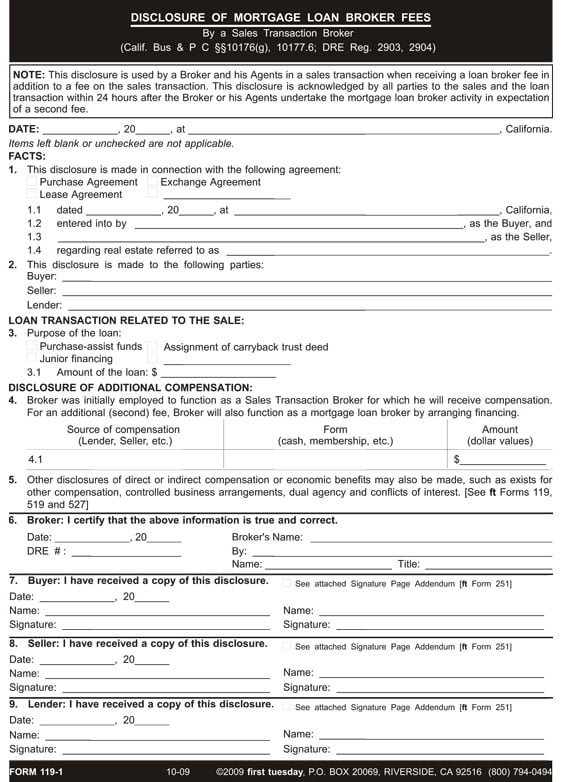Double dipping: a second fee on a sale paid by the lender or loan broker
When a listing or selling broker in a sales transaction expects to receive a loan broker fee or any other fee related to the buyer’s purchase assist loan which will be paid in addition to his fee on the sales transaction, first tuesday Form 119-1, Disclosure of Mortgage Loan Broker Fees – By a Sales Transaction Broker, is to be used.
Consider a selling agent representing a buyer in a sales transaction. In addition to performing the regular agency duties owed to the buyer, such as using diligence and coupling the information he receives with specific advice he gives to his buyer, the agent intends to receive an additional fee in connection with the buyer’s loan.
To concurrently act as a sales transaction agent and perform loan related activity in expectation of an additional fee, the agent and his broker must comply with two tiers of law to avoid facing a penalty. The first tier is the federal Real Estate Settlement Procedures Act (RESPA), also known as Regulation X. RESPA establishes a no-service, no-second-fee restriction on real estate brokers and agents who are already acting on behalf of a buyer or seller in a one-to-four unit residential real estate sales transaction financed by a RESPA loan (which nearly all are). When a broker (and his agent) is already receiving a fee on a sales transaction, the lender may only pay the broker a fee if the broker (or his agents) performs significant services on behalf of the lender. Thus, they must act as a mortgage loan broker in arranging the loan.
Thus, a broker may only receive a second fee in addition to their sales transaction fee if he or his agents renders significant loan origination services which would otherwise be performed by the lender. A lender or sales broker is in compliance with the no-service, no-second-fee rule if the earnings the broker is to receive for the second service were due the sales transaction broker as:
- payment for goods delivered by the broker; or
- payment for services rendered by the broker or his agents. [12 United States Code §2607(c)]
A broker who is to receive a broker fee on a sales transaction controlled by RESPA may accept another fee for an additional second significant service used by the seller, buyer or lender in the transaction. One such fee is paid by a lender (or a representative of the lender – a loan broker) to the sales broker for the performance by the broker or his agent of at least five loan origination activities normally handled by the lender or a loan broker. Further, if sufficient loan origination activities are performed by the broker or his agent, then the amount of the second fee for loan related services must be justified as a dollar amount others would be paid to competitively perform the same services. [See our “The Real Estate Settlement Procedures Act (RESPA)” article from July, 2008.]
In addition to compliance with the federal RESPA requirements, the sales transaction broker receiving a fee related to the loan must comply with state law. For the broker to comply with state agency law, he must disclose to his client all forms of compensation he is to receive, the total dollar amount of compensation and the source of all benefits evolving from the transaction. [See first tuesday Form 119]
However, when acting as a mortgage loan broker on behalf of the buyer (or the lender) to justify collection of a second fee under agency law, the second fee must be acknowledged by all parties to the sale and loan transactions, including the buyer, seller and lender. Brokers or their agents have 24 hours after undertaking the loan related activity, when performed in expectation of a second fee, to disclose the expectation of that second fee and obtain the consent of all parties before proceeding to further represent the client. [See first tuesday Form 119-1 below]
Much abuse of both RESPA work requirements and agency law disclosure-and-consent requirements occurred during the recent Millennium Boom when lenders and loan brokers were offering and paying referral fees directly to agents to drive their loan business. When excess funds are loosely floating around as they were, it is startling what some lenders and licensees will do to get in on the action. For those who abide by the rules of law, it is difficult if not impossible to compete with such corruption.













